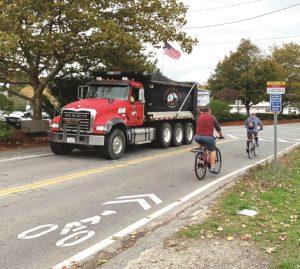PROVINCETOWN — Town meeting may be the textbook example of New England democracy — but that’s only because the textbook writers haven’t been to the annual traffic hearing here.
Once a year, anyone can submit a proposal to improve traffic flow or safety and try to persuade the select board to vote for it. Many proposals are highly specific — moving a parking space by two feet, for instance; others affect traffic patterns town-wide.
The deadline for proposals is Oct. 28, so the agenda for this year’s hearing on Nov. 7 is not yet posted. Bicycle committee Vice Chair Chris Mathieson has already filed four proposals. Two of them aim to improve safety for cyclists and pedestrians along the Winthrop Street corridor, which he says is a safer alternative to Shank Painter Road. The third asks the town to hire a traffic engineer to study safety on Commercial Street; the fourth proposes bicycle-based luggage taxis, which Mathieson says could encourage people to take the ferry from Boston instead of driving.
State crash data prove that there’s a problem, Mathieson said. The Commercial Street corridor is among the most dangerous 5 percent of roadways on Cape Cod for both pedestrian-involved crashes and bicycle-involved crashes, according to the Dept. of Transportation’s crash dashboard. Between 2010 and 2019, the records show 21 bicycle-involved crashes in that area and 24 pedestrian-involved crashes, including one “incapacitating injury” in 2012.

The Provincetown police maintain town-wide tallies of traffic accidents, which Chief Jim Golden presented to the select board last week. That report shows the number of incidents declining every year from 2017 to 2020, but then increasing in 2021 and again in 2022. The number of incidents through Sept. 27 of this year has already exceeded the 2021 total.
Mathieson’s proposal for a traffic study of Commercial Street includes more recent data for that corridor. Of 19 incidents on Commercial Street between May 15 and Sept. 15 this year, six were serious enough to require an EMS response, the police said.
“Chief Golden can close Commercial Street to vehicles at his discretion starting at 9 p.m. on Friday and Saturday,” Mathieson said. “Last year, I asked the select board to expand those hours and make them mandatory, from 6:30 p.m. to 2 a.m.”
Mathieson got no votes for that proposal, so this year he’s proposing a professional traffic study instead.
“Ninety-five percent of the traffic is pedestrians and bicycles,” Mathieson said, “and now there’s scooters, electric skateboards, more pedicabs. The lack of management is not tenable. We need to implement policies before we get into next summer, to protect people. Accidents are not accidents. It’s poor design.”
Safety at Stop & Shop
A marked pedestrian and bicycle corridor up Winthrop Street and across Shank Painter Road is another of Mathieson’s proposals. He said it would help people avoid Shank Painter Road, where cars travel fast and the shoulders are thin and full of gravel.

“The crossing from Court Street to Stop & Shop is completely dark,” said Mathieson. “There’s no light for the bus stop. It’s the worst design you can imagine.
“It’s mostly Jamaican women walking down Shank Painter to the grocery store,” he said, adding that exiting the parking lot on a bicycle is also dangerous.
The town’s improvement of Shank Painter Road will begin in two years, but Mathieson said Winthrop will still be the safer alternative for cyclists and pedestrians. His proposals call for changes at three intersections: Winthrop at Commercial, Winthrop at Bradford, and Court Street at Shank Painter.
Ultimately, bike travel is about decarbonization, Mathieson said. The Cape Cod Commission has found that 43 percent of emissions on Cape Cod come from roadway travel while only 1.4 percent come from ferry traffic. The per-person carbon footprint of a ferry ride from Boston to Provincetown is less than half that of a highway journey, said Steven Tupper, deputy director at the commission.
To make ferry travel to Provincetown easier, Mathieson wants the town to support a bikes-with-trailers pilot program for transporting luggage. Luggage is a big reason people choose cars, Mathieson said, and a carbon-free way to transport it could help people choose the ferry more often.
Mathieson is working out the pilot program with Mike Glasfeld, owner of Bay State Cruise Company, and Alex Toller, owner of Commercial Street Pedicabs. He’s not looking for money from the town but is asking for “support and leadership,” he said. Mathieson wasn’t sure if luggage transport would require an individual license, as pedicabs and taxi drivers are required to have.
Provincetown needs to lead on emissions reductions, Mathieson said, because sea level rise is an existential threat.
“This town is irreplaceable,” he said. “If we don’t allow the people of the future to have it because we’re not paying attention — I think it’s criminal.”



